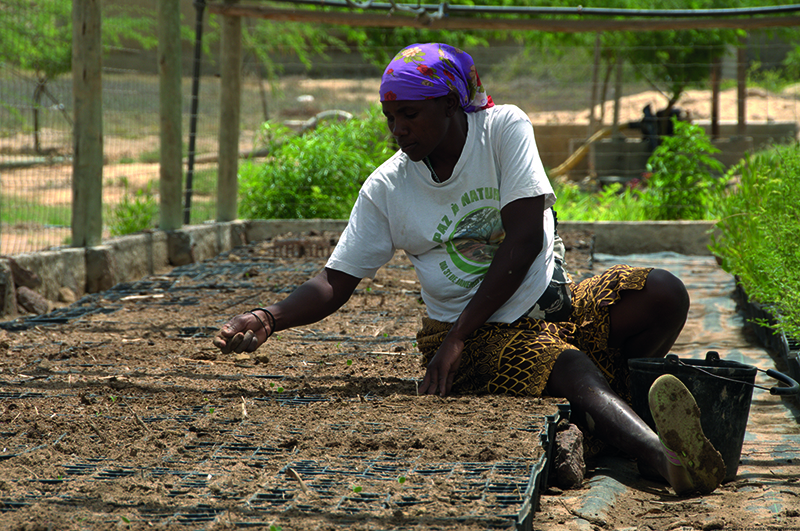Sodepac is helping to transform agriculture in Angola as it strives to create a sector that is more productive, environmentally sustainable, socially inclusive and competitive

Before the civil war, Angola’s agriculture sector flourished. Fully self-sufficient for food, Angola was also the world’s third-largest producer of coffee and sisal. When the war ended in 2002, things looked radically different. Not only did Angola’s agriculture sector lie in ruins, but Angola was now heavily reliant on both costly international food imports and on revenues from its main export – oil.
The return of peace and political stability has since provided the ideal circumstances to change this situation. Recognizing the need to end oil dependency, reduce food imports and diversify the economy, the government has focused on transforming the country’s agriculture sector. With ambitions of full food self-sufficiency and a revived agricultural export industry, the country has embraced a brave new rural development model. Sustainable, economically viable, socially inclusive and environmentally sound, it aims to release the largely untapped potential of the agricultural sector in Angola, helped greatly through the work and stewardship of the Sodepac Company.
Sodepac (the Society for the Development of Capanda Agro-Industrial Unit) is charged with the important task of organizing, managing and developing the Capanda Agro-Industrial Growth Point (PAC) Zone in northern Malanje. The 411,000-hectare facility produces corn, soya beans, cassava, cotton and dairy, and includes the farms of Pedras Negras, Biocom, Pungo Andongo, and the Food Company of Malanje.
A publicly funded limited company, Sodepac’s work is a key part of the Angolan National Development Plan for 2013-2017 and is crucial to the realization of the rural development model that promises to transform agriculture sector and make the republic more competitive and self-sufficient.
Earlier this year, Carlos Fernandes, Chairman of the Board of Directors, announced plans to convert 186 villages into 12 agro-towns as part of the company’s social betterment program in rural areas. The aim is to combine the villages and create better housing, sanitation, cultivation and drinking water conditions for the population.
Six foundational principles underpin Sodepac’s mission, which include the establishment of supply chains of production and leadership by anchor companies. As Mr. Fernandes notes: “More than 70% of current production in the country is in the hands of family farms.” Presently, these family farms or small to medium-sized enterprises (SMEs) are not successfully integrated into the agricultural supply chain. To remedy this, large-scale, publicly funded, long-term investment is needed.
Anchor companies can perform this role. “The country needed to start large companies with public capital, as you can see in Cuando Cubango province and in Pungo Andongo located in the Pedras Negras area,” Mr. Fernandes says. “The intention is for these companies to manage and complete the production chain.”
The use of advanced technology and increased competitiveness are intrinsic to Sodepac’s work and are, Mr. Fernandes notes, inter-connected. “The key to competiveness is precisely the technologies used,” he says. “Without these technologies adapted to the tropical climate, the cost structure of firms may be very high and the final price will not be in any way competitive with the international market.”
Preservation of the environment as well as social development and inclusion complete the list of the company’s foundational principles. As Mr. Fernandes explains, “We have a social development plan that covers three main areas: the issue linked to the income of the population through agricultural production, treatment of health issues and living conditions, and finally the aspect related to citizenship – the organization of communities and the creation of cooperatives and associations.”
Sodepac is already starting to deliver results. Productivity at Biocom, one of the farms located in Cacuso, has so far proved successful. Run by the Angola Bio-energy Company – a partnership between Odebrecht, the Angolan company Damer Industria, and the state-run petroleum company Sonangol Holding – it covers over 162 square miles. Focused on the production of sugar and ethanol, Biocom has so far produced over 18,000 tons of sugar and over 3,000 cubic meters of ethanol.
This success can be attributed to the completion of supply chains through anchor companies, according to Mr. Fernandes. “Biocom for example, in Capanda, is coordinating the sugar production chain,” he says. “Biocom is building capacities to assist small businesses and country workers. It is providing technical assistance, ensuring the market, transforming the product, and putting it in the market.”
The Pedras Negras farm has successfully demonstrated how new technologies can be developed in agricultural production by showing the technological potential for producing, harvesting, drying and storing maize and soya.
The 24,700-acre farm currently has a stock capacity of 10,000 tons of grain.
Another success story for Sodepac has been social development and inclusion. The family farming program ‘Kukula Ku Moxi’ at Pedras Negras was launched in 2010 and has since delivered a number of positive impacts for Pungo Andongo’s rural communities. As a result of this program, a substantial rise in family income for local families has led to living standards improving for at least 2,500 country farmers. In addition, more than 11,000 people gained access to drinking water and another 3,500 people benefited from improved diets. There was also a drop in infant mortality from 118 to 33 deaths a year.
Results are therefore very promising. As Sodepac continues to transform Angolan agriculture, the investment opportunities opening up are not only huge but also very welcome.
“Angola is a stable country both politically and socially,” Mr. Fernandes states. “We have favorable legal instruments for private investment, particularly foreign. My message is that investors should come and focus their attention on Angola and particularly its agri-business.”
0 COMMENTS